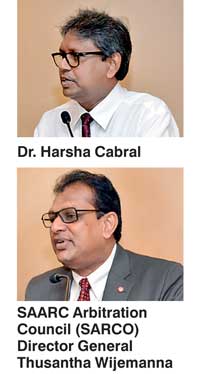Monday Feb 23, 2026
Monday Feb 23, 2026
Wednesday, 6 April 2016 00:00 - - {{hitsCtrl.values.hits}}
From left: Dr. Harsha Cabral, International Chamber of Commerce Sri Lanka (ICCSL) Chairman Keerthi Gunawardane, Federation of Chambers of Commerce and Industry of Sri Lanka (FCCISL) President Sarath Kahapalarachchi, SAARC Arbitration Council (SARCO) Director General Thusantha Wijemanna, International Chamber of Commerce Sri Lanka (ICCSL) Immediate Past Chairman Tissa Jayaweera and SARCO Deputy Director Malik Imran Ahmed at the head table
By D.C. Jayasundera
Renowned legal personality Dr. Harsha Cabral claimed that arbitration has failed in Sri Lanka due to the impediments caused by legal professionals at a seminar organised by the SAARC Arbitration Council (SARCO). He pointed out the appointment of certain incompetent retired judges and the over-involvement of lawyers in arbitration proceedings as the two main factors in hindering the commercial arbitration circuit.
Arbitration is regarded as a highly efficient alternative dispute resolution method in resolving commercial disputes. A litigation case which take years to get a ruling, may only take 6-12 months to get an enforceable awarding through arbitration. In highlighting the advantages, Dr. Cabral emphasised that one key aspect in arbitration is that the parties are considered autonomous. “This allows the parties to have the freedom to appoint their own judge, to agree on their own rules and law. This degree of flexibility is not offered in the court system,” stated Dr. Cabral.
Even in such a rewarding context the public still suffers from a ‘litigious psyche’ and tendency towards court litigation to resolve disputes said Dr. Cabral. He quipped that this mentality has even resulted in an over-supply of lawyers to the legal system.
In highlighting the causes for the dreadful state of arbitration in the country Dr. Cabral professed that ‘Arbitration has become a club operation in Sri Lanka where lawyers meet up in the evenings to make a side income’. He concluded that the major problem in the arbitrary act is the ubiquitous role the court system plays in it. This would give way in to more litigation than expected in an arbitration system. As a result instilling of court mechanisms and lawyers become an intrinsic part of the arbitration process which derails the effectiveness of it.
The SAARC Arbitration Council (SARCO) Director General Thusantha Wijemanna elaborated on the necessity of a strong regional arbitration circuit to increase economic integration among the South Asian countries. He stated that one major reason for the low intra-trade between the countries of the region is the lack of faith among commercial parties on regional arbitration resolution.
SARCO which is headquartered in Islamabad, Pakistan was established to foster better economic relationships among member nations. It currently provides a legal framework and assistance for fair and efficient settlement through conciliation and arbitration of commercial, investment and related disputes within the region.
Pix by Upul Abayasekara